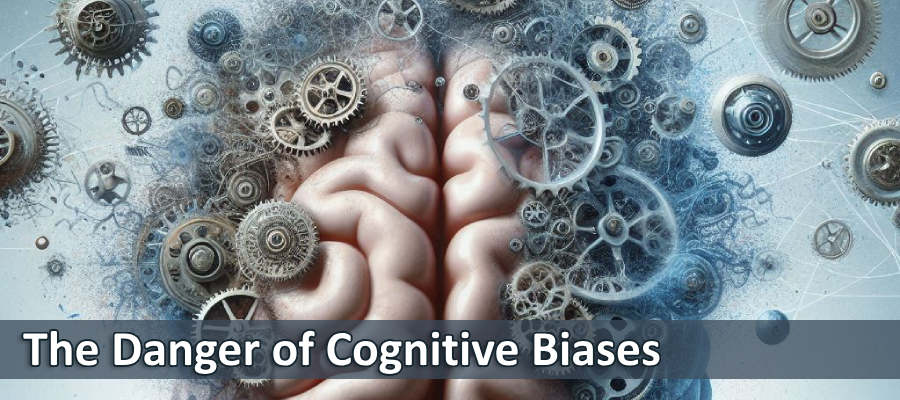An Important Lesson on Cognitive Biases
In an unusual incident that unfolded in Lee County, Florida, a woman was apprehended after she attempted to steal a car and, in a bizarre twist, called 911 to report her own crime. The woman believed that by informing the police of her intentions, she could somehow render the theft legal. This peculiar behavior highlights the presence of cognitive biases and demonstrates the dangers they pose in our decision-making processes.
The Incident
On the night of May 31, 2024, at Val Ward Cadillac in Fort Myers, a woman attempted to steal a Toyota Corolla. She called 911 to inform the authorities of her actions, under the mistaken belief that her advance notice would make her actions lawful. Upon arriving, deputies found her exiting the vehicle and arrested her for trespassing, as the dealership was closed at the time. Although seemingly trivial, this incident provides us with a profound insight into the workings of cognitive biases.
Cognitive Biases at Play: The Dunning-Kruger Effect
The woman’s belief that her crime could be legitimized by notifying the authorities is a classic example of the Dunning-Kruger effect. This cognitive bias occurs when individuals with limited knowledge or competence in a domain overestimate their own abilities or understanding. In this case, the woman’s limited understanding of the legal system led her to a highly flawed conclusion about the legality of her actions.
The Dunning-Kruger effect often manifests in overconfidence and poor decision-making as individuals fail to recognize their own lack of expertise. This bias can lead to serious consequences in everyday life and professional settings, where critical decisions are made.
Other Potential Cognitive Biases at Play
The sad truth is that the Dunning-Kruger effect may not have been the only cognitive bias at play in this case. It seems that this poor girl may have been inundated with various types of cognitive bias. A few that I can think of include:
- Illusory Superiority: Illusory superiority is a bias wherein individuals overestimate their own qualities and abilities relative to others. The woman might have believed that her idea to call the police was a clever and superior strategy that others would not have thought of, highlighting her unique “ingenuity.” Of course, this overestimation of her cleverness led her to act in an objectively irrational way.
- Misunderstanding of Probability: This bias involves misjudging the likelihood of events. In many ways, it is either a complete avoidance or ignorance of the realities surrounding “cause and effect.” The woman may have believed there was a high probability that her call would result in the police condoning her actions. At the same time, she clearly underestimated the certainty with which law enforcement would enforce the law against car theft.
- False Consensus Effect: This bias typically leads individuals to overestimate the degree to which others agree with them. While we may never truly understand what was going on in her head, the woman might have believed that the police would share her perspective on the legality of her actions once she explained her intent, assuming her rationale was universally understandable and acceptable.
- Magical Thinking: Magical thinking is the belief that one’s thoughts, actions, or words can influence the outcome of situations in ways that defy conventional logic. By informing the police of her intentions, she might have believed that she could change the reality of her actions, essentially “magically” transforming an illegal act into a legal one through the power of her disclosure.
- Confabulation: Confabulation involves the creation of false memories or the distortion of existing memories without the intent to deceive. The woman’s reference to “a game of Black Ops” could indicate a blurring of lines between reality and fantasy, where she genuinely believed that her actions were part of some permissible scenario, thus confabulating the legality of her actions.
- Naïve Realism: This is the belief that we see the world objectively and that people who disagree with us must be uninformed, irrational, or biased. Unfortunately, this one is practically an epidemic in our society these days. In this scenario, the woman might have thought that her view of the situation (that calling the police would make her actions legal) was the only logical perspective, dismissing the actual legal standards as irrelevant or incorrect.
The Dangers of Cognitive Biases
Cognitive biases are systematic patterns of deviation from rationality in judgment. They often result from the brain’s attempts to simplify information processing. While these biases can sometimes be helpful shortcuts, they frequently lead to errors in reasoning and judgment. Some of the dangers include:
Overconfidence: As seen in the Florida incident, overconfidence in one’s knowledge can lead to reckless behavior and poor decision-making.
Confirmation Bias: The tendency to search for, interpret, and remember information in a way that confirms one’s preconceptions. This can result in ignoring important information that contradicts existing beliefs.
Anchoring: This is a big one that most people are conditioning into. Anchoring is when we rely too heavily on the first piece of information encountered (the “anchor”) when making decisions. This limited information typically skews judgments and leads to suboptimal choices. Remember, the “key” (and balance) is often found by examining contrasting information – not avoiding it.
Hindsight Bias: Hindsight is often 20/20. The tendency to see events as having been predictable after they have already occurred is Hindsight Bias. Unfortunately, this can lead to overestimating one’s ability to predict outcomes and underestimating risks.
Preventing Cognitive Biases
While various types of cognitive biases are (clearly) strong, all is not lost. We don’t have to end up making such profound mistakes. Of course, while it is impossible to completely eliminate our cognitive biases, there are some strategies that can help mitigate their impact:
Awareness and Education: Learn and continue to learn. Understanding the various cognitive biases and their effects is the first step in mitigating their impact. Educating oneself about these biases can lead to more informed and rational decision-making. After all, it helps to know what you’re up against so you can resist the influence.
Critical Thinking: Developing strong critical thinking skills can help individuals analyze situations more thoroughly and question their own assumptions and beliefs. To increase critical thinking skills, engage regularly in activities that require analysis, evaluation, and synthesis of information, such as reading diverse materials, solving complex problems, and debating with others. Additionally, practice reflective thinking by questioning your assumptions, considering alternative viewpoints, and evaluating the evidence before drawing conclusions.
Seeking Diverse Perspectives: Consulting with others and considering multiple viewpoints can provide a more balanced understanding and help counteract personal biases. Again, the key is in the contrasting information. Find someone close to you to “tear it (your idea) apart.”
Reflective Thinking: I have said it so many times – all learning is useless without critical reflection. Taking time to reflect on ideas and decisions and considering potential biases that may have influenced them can lead to more thoughtful and deliberate actions.
Decision-Making Frameworks: Strategy is King! Using structured decision-making frameworks and checklists can help ensure that all relevant factors are considered and that decisions are not solely based on intuition or incomplete information. Or… we can just fall into our decisions and hope they work out.
In Closing
The incident in Lee County, while somewhat amusing, is also a major red flag for the rest of us. Understand that a similar case (the McArthur Wheeler incident) was actually the inspiration behind the discovery of the Dunning-Kruger effect. In my opinion, we should use these incidents as a reminder of how cognitive biases can lead us to irrational and misguided behavior. However, by understanding and addressing these biases, we can improve our decision-making processes and avoid the pitfalls of overconfidence and faulty reasoning. Be aware, think critically, and question with boldness – everything!




